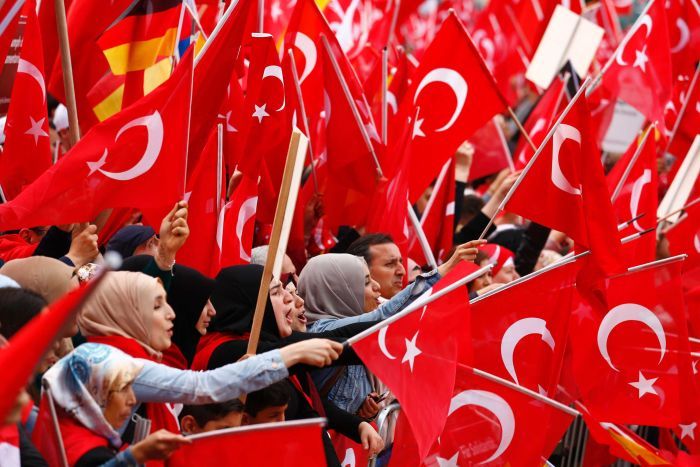Turkey’s crackdown threatens German stability, Gulen followers fear

Date posted: August 28, 2016
By freelance correspondent Andrew McCathie in Berlin
As storekeeper Cem Celik closes his small supermarket in one of Berlin’s traditional Turkish neighbourhoods for the night, he is bracing himself for what lies ahead.
For weeks, he has suffered threats of boycotts.
His staff have been abused and called “traitors”, “terrorists” and even “sons of bitches”.
Like the 100,000 other German followers of US-based religious leader Fethullah Gulen, he is a prime target for harassment by supporters of Turkey’s authoritarian President Reccep Tayyip Erdogan.
Now the Gulen community believes Mr Erdogan’s purge is spreading its tentacles into Germany.
From Berlin, Mr Celik watched the President’s furious crackdown on dissidents in Turkey with trepidation.
It has resulted in 26,000 arrests. Around 80,000 professionals have been suspended from their jobs, and, a few days ago, nearly 3,000 judges were sacked.
Many thousands have been imprisoned, and Amnesty International has reported claims of torture and rape, though these are staunchly denied by the Government.
Ankara has designated the pacifist Islamic movement a terrorist organisation, accusing it of building a parallel state within the country, aimed at seizing power.
Mr Erdogan has moved to rid the country of that threat.
“Erdogan describes what’s happening in Turkey as a second liberation struggle. He has called it a holy war,” Gulenist Institute for Dialogue and Education in Germany chairman Ercan Karakoyun said.
Now, as the summer holidays end, Mr Celik and other members of Germany’s Gulen minority fear they will come under fresh attacks as large numbers of Germany’s Turkish community return from holidays in their homeland.
Few Gulenists will speak openly — including Mr Celik — who also asked the ABC to disguise his name.
Mr Karakoyun expressed the terror they feel:
“I can’t imagine what will happen when a lot of people return to Germany full of hate for Gulen followers.”
German Chancellor Angela Merkel recognised the threat this week, warning the Turkish population to avoid stirring up political violence.
“We expect from people of Turkish origin, who have already lived in Germany a long time, that they develop a high level of loyalty to our country,” she said.
Turks began arriving in Germany as guest labourers in the 1960s to fill the gaps in the workforce resulting from the nation’s post-World War II development.
Many maintain strong ties to Turkey.
The majority of the more than 3 million-strong community fiercely support Mr Erdogan.
Thousands of flag-waving supporters swelled the streets of Berlin and other cities in the wake of Turkey’s failed coup.
“Erdogan sees Gulen as an enemy,” said Mr Karakoyun, who has been targeted by six or seven death threats.
One chilling message on his Facebook page read:
“You [Gulenists] think you’re not safe in Turkey. You’ll soon find out you are not safe here either.”
Germany’s Gulen institutes attacked
Germany’s Gulen community is under siege.
Their institutes across Germany have been attacked, and a youth centre was stormed by about 150 club-wielding Erdogan supporters.
Germany’s Interior Minister Thomas de Maiziere called for calm.
“We don’t want these kinds of conflicts to play out in Germany with violence in the streets,” he warned.
But the intimidation has continued. Several properties had windows smashed, while calls have gone out to boycott Gulen-related businesses.
Even at Friday prayers, they face abuse.
Levent Bayram, a Berlin-based social media executive, was in his local mosque when someone shouted at him: “I’m not prepared to pray with a terrorist in the room.”
“Many Erdogan supporters see it as Jihad,” Mr Karakoyun explained.
“As a result, they are threatening and insulting.”
But the threat is stepping up a notch.
This week, Der Spiegel magazine reported Turkey’s secret service has asked Germany’s foreign intelligence agency (BND) for help rounding up Gulen followers. The BND would not comment.
The following day, Die Welt newspaper claimed 6,000 informers in the Turkish community were spying for Turkish intelligence.
Despite the increasing hostility and fear, Germany’s Gulenists are persevering with their projects, calling for peace and interfaith dialogue.
The Gulen movement is called Hizmet, meaning “service”. It aims to build a civil Islam through a series of educational centres, forums and schools in 160 countries around the world.
It is a driving force behind the House of One project under construction in central Berlin.
It will be the world’s first place of worship for three religions — Christian, Muslim and Jewish.
Mr Karakoyun is confident Turkey’s crisis will not threaten the House of One project.
“The dialogue has already begun,” he said.
While he remains very pessimistic about events in Turkey, he believes Gulenist ideas still have a future there.
“You can destroy all the buildings, but you cannot influence the thoughts and feelings of the people,” he said.
“Ideas are resilient.”
Source: ABC NEWS , August 27, 2016
Tags: Christian Muslim dialogue | Defamation of Hizmet | Germany | Hizmet and politics | Military coups in Turkey |


























